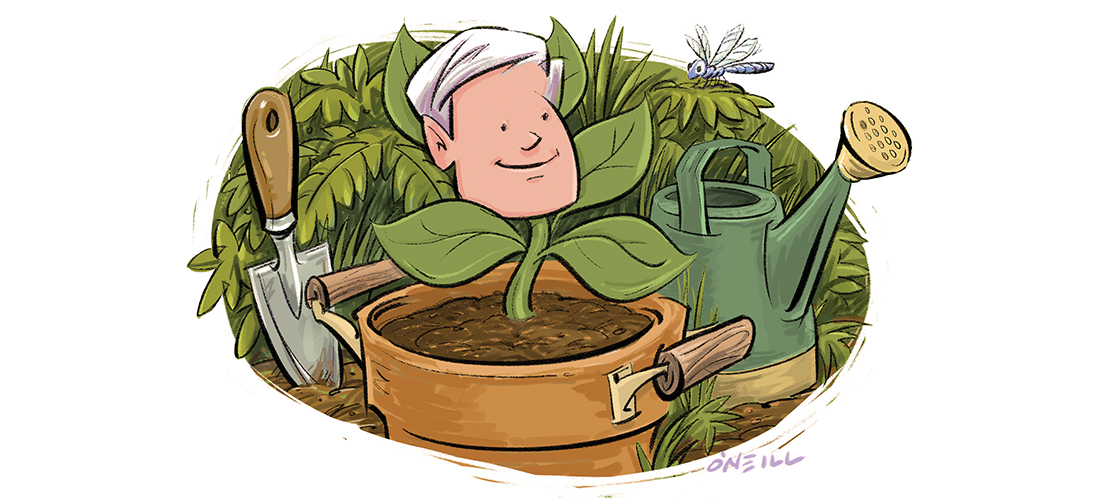Summer twilight
The brief, magical time between day and night
by Jim Dodson
Illustration by Gerry ONeill
Not long ago as a beautiful summer evening settled around us, my wife and I were sitting with our friends, Joe and Liz, on the new deck facing our backyard shade garden, enjoying cool drinks and the season’s first sliced peaches.
The fireflies had just come out. And birds were piping serene farewell notes to the long, hot day.
“I love summer twilight,” Joe was moved to say. “Everything in nature pauses and takes a breath.” He went on to remember how, growing up in a big family of nine children, “my mother would shoo us all outdoors after supper to play in the twilight until it was dark. It was a magical time between day and night. A glimpse of heaven.”
“We played Kick the Can and Red Light, Green Light,” Liz remembered. “The fading light made it so much fun.”
“And flashlight tag,” chimed Wendy, my wife, sipping her white wine and joining the memories. “We didn’t have to come in until the first stars appeared and my mother called us to come in for a bath and bed.”
In a world that increasingly seems so different from the quieter, simpler one we grew up in, we all agreed, something about twilight seems about as timeless as moments get in this harried and overscheduled life we all live.
In truth, our ancient ancestors held much the same view of the changing light that occurs when the sun sinks just below the horizon, or rises to it just before dawn, softly stage-lighting the world with a diffusion of light and dust, heralding either the prospect of rest or awakening.
Like most rare things, the beauty seems to be in its brevity. Back when I was a small boy in a large world, summer twilight was especially meaningful to me. During my father’s newspaper career, we lived in a succession of small towns across the sleepy, deep South where we rarely stayed in one place long enough for me to make friends or playmates. Because it was a time before mass air conditioning, I lived outdoors with adventure books and toy soldiers for companions, building forts and conducting Punic wars in the cool dirt I shared with our dog beneath the porch. The heat and brightness of midday made my eyes water and my head hurt.
In the rural South Carolina town where I attended first grade, a formidable woman named Miss Jesse restored my mother, a former Maryland beauty queen, to health following a pair of late-term miscarriages, and taught her how to properly cook collards and grits. Come midday, while my mother rested, Miss Jesse would haul me out from under the porch and make me put on sandals to accompany her to the Piggly Wiggly or to run other errands around town in her baby blue Dodge Dart.
Beneath a stunning dome of heat that lay over the town like a death ray from a Martian spaceship, it was Miss Jesse who explained to me that daytime was when the world did its business and, therefore, shoes and good manners were necessary in public. Removing my sandals to feel the cool tile floors of the Piggly Wiggly beneath my bare feet — the only air conditioned place in town save for the newspaper office — was a tactical error I made only once, as Miss Jesse had complete authority over my person.
Yet it was also she who had me stand on her feet, dancing my skinny butt around the kitchen as she and my mother cooked supper to gospel music playing from the transistor radio propped in the kitchen window. Miss Jesse also informed me that both a good rain and twilight were two of the Almighty’s holiest moments, the former refreshing the earth, the latter replenishing the soul.
I often heard her singing a gospel tune I’ve since spent many years unsuccessfully trying to find, a single line of which embedded itself in my brain: “In the shadows of the evening trees, my lord and savior stands and waits for me.”
Miss Jesse was with us for only a single summer and autumn. She passed away shortly before we moved home to North Carolina. But I have her to thank for restoring my mom’s health and giving me a love of collards, a good rain and summer twilight.
The suggestion of that old hymn she loved speaks to another perspective on twilight. Some poets and philosophers have used it as a metaphor, indicating the fading of the life force. Others view it as the end of life, a dying of the light that symbolizes the coming of permanent night, a prelude to death.
On the other hand, as I read in a science magazine not long ago, all living things would fade and die from too much light or darkness were it not for twilight, that in-between time of day when we see best. For that reason, metaphorically speaking, it’s worth remembering that twilight also comes before the dawn breaks, marking the beginning of the day, the renewal of activity, a resumption of life’s purposes.
Tellingly, birds sing beautifully at both ends of the day — a robust greeting to the returning light of dawn and a solemn adieu as twilight slips into dusk.
As a lifelong fan of the twilight that exists fleetingly at both ends of the day — someone who is fast approaching his own so-called twilight of life — I take comfort in the words attributed to Saint John of the Cross who wrote, “In the twilight of life, God will not judge us on our earthly possessions and human success, but rather on how much we have loved.”
I also love what actress Marlene Dietrich famously said about the summer twilight — namely that it should be prescribed by doctors. It certainly heals something in me at day’s end.
A friend I mentioned this to not long ago sent me a short poem by a gifted poet named Joshua Henry Jones Jr., a son of South Carolina who passed away about the time Miss Jesse was teaching me to “feet dance” in my mama’s kitchen.
It’s called “In Summer Twilight” and nicely sums up my crepuscular passion.
Just a dash of lambent carmine
Shading into sky of gold;
Just a twitter of a song-bird
Ere the wings its head enfold;
Just a rustling sigh of parting
From the moon-kissed hill to breeze;
And a cheerful gentle, nodding
Adieu waving from the trees;
Just a friendly sunbeam’s flutter
Wishing all a night’s repose,
Ere the stars swing back the curtain
Bringing twilight’s dewy close.
Now, if I could only find that sweet gospel hymn that still plays in my head. SP
Jim Dodson is a New York Times bestselling author in Greensboro.


